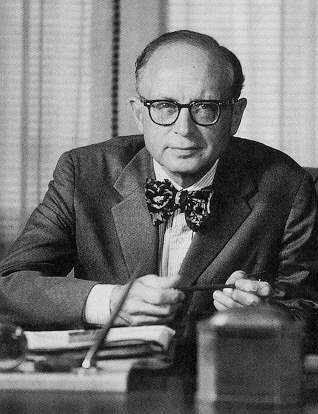
Daniel J. Boorstin
Daniel Joseph Boorstin (October 1, 1914 – February 28, 2004) was an American historian at the University of Chicago who wrote on many topics in American and world history.[2] He was appointed the twelfth Librarian of the United States Congress in 1975 and served until 1987. He was instrumental in the creation of the Center for the Book at the Library of Congress.[2][3]
Daniel J. Boorstin
February 28, 2004 (aged 89)
Washington, D.C., U.S.
3
Julia Boorstin (granddaughter)
Pulitzer Prize for History (1974)
Repudiating his youthful membership in the Communist Party, Boorstin became a political conservative and a prominent exponent of consensus history. He argued in The Genius of American Politics (1953) that ideology, propaganda, and political theory are foreign to America. His writings were often seen, along with those of historians such as Richard Hofstadter, Louis Hartz and Clinton Rossiter, as belonging to the "consensus school", which emphasized the unity of the American people and downplayed class and social conflict. Boorstin especially praised inventors and entrepreneurs as central to the American success story.[4][5]
Smithsonian Institution Career[edit]
Boorstin became director of the Smithsonian Institution's National Museum of History and Technology (MHT) on October 1 1969, after its founding director Frank A. Taylor assumed a pan-institutional role as Director General of Museums.[19] Boorstin stepped down as director of MHT in 1973 to assume the position of Senior Historian, "so that he could devote more time to research and writing."[20] He served the Smithsonian until his 1975 presidential appointment as Librarian of Congress.
As MHT director, Boorstin presided over several landmark exhibitions, including the 1970 show, “Do it the Hard Way: Rube Goldberg and Modern Times,” honoring the illustrator and artist, Rube Goldberg. Boorstin conceived of the exhibition, one of his first as MHT director.[21] At a preview of the show, Boorstin remarked: “There have been exhibits of Einstein and Dr. Salk and Isaac Newton, but the exhibits here show us not only how to enrich and deepen man, but how to amuse him. This show is about the ways we've discovered to give ourselves a headache. It tells us where technology leads us and misleads us, and touches the life of every American. Rube Goldberg foresaw the road to the electric toothbrush.”[22]
One of Boorstin's most influential public programs at MHT were the Frank Nelson Doubleday Lectures, which began in 1972 focusing on 'technology and the frontiers of knowledge' and featured speakers such as writers Saul Bellow, Isaac Asimov, and Arthur C. Clarke, and technologists like Sony's founder Akio Morita.[23]
Completed during his Smithsonian tenure and published in June 1973, The Americans: The Democratic Experience was awarded the Pulitzer Prize in early 1974.[20] Boorstin was the first Smithsonian employee to receive the award.
Honors[edit]
His book, The Americans: The Colonial Experience (1958) won the Bancroft Prize for best book on history. The Society of American Historians awarded Boorstin the Francis Parkman Prize for The Americans: The National Experience (1965).[9] Boorstin was awarded the Order of the Sacred Treasure, First Class, by the Japanese government in 1986. He received the Golden Plate Award of the American Academy of Achievement in 1986.[24] He was awarded a Pulitzer Prize for writing The Americans: The Democratic Experience (1973).[6]
He was a member of both the American Academy of Arts and Sciences and the American Philosophical Society.[25][26]
He was inducted into the Tulsa Hall of Fame in 1989, and received the Oklahoma Book Award in 1993 for The Creators.[6] He was posthumously inducted into the Georgia Writers Hall of Fame in 2023.[27]
He held twenty honorary degrees, including an honorary Doctor of Laws from the University of Tulsa[6] and Doctor of Letters from Oglethorpe University in 1994.[28]